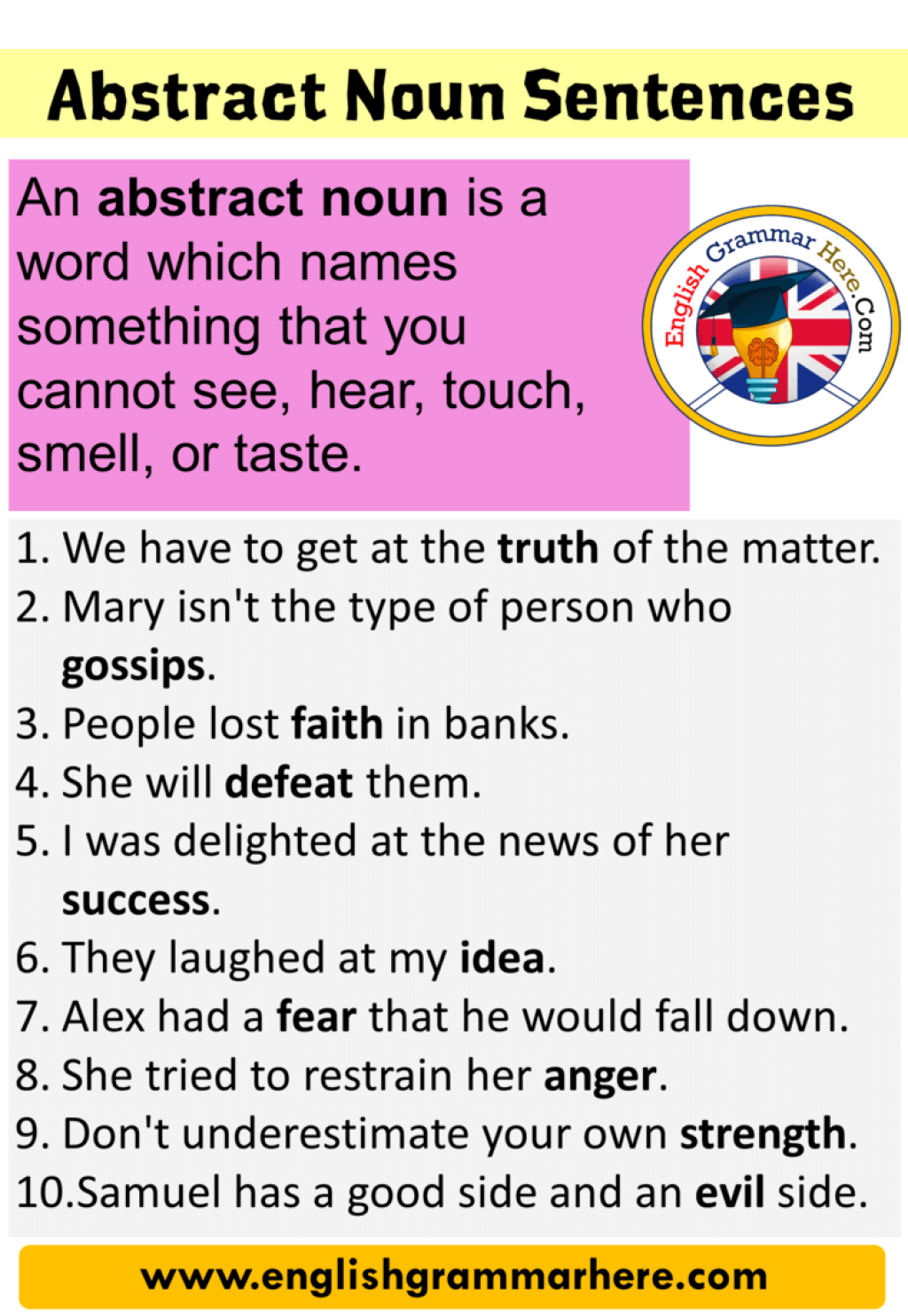Unlocking The Power Of Abstracts: Engaging Example Sentences That Inspire Action!
Example Sentence of Abstract: Understanding the Importance and Application
Introduction
Welcome, Smart Readers, to this informative article on the example sentence of abstract. Abstracts are concise summaries that provide an overview of a research paper, article, or document. They serve as a quick glimpse into the main points and findings, helping readers determine whether they want to read the full text. In this article, we will explore the significance of abstracts, their components, and examples of well-crafted abstract sentences.
1 Picture Gallery: Unlocking The Power Of Abstracts: Engaging Example Sentences That Inspire Action!

Abstracts play a crucial role in academia, aiding researchers, scholars, and students in quickly evaluating the relevance and quality of a study. By mastering the art of writing effective abstract sentences, one can enhance the visibility and impact of their work. So, let’s delve into the world of abstracts and discover how to create compelling sentences that captivate readers and convey the essence of a document.

Image Source: englishgrammarhere.com
Before we proceed, let’s familiarize ourselves with the components of an abstract. Typically, an abstract contains information about the purpose, methodology, results, and conclusion of a study. It summarizes the key points concisely, providing enough context for the reader to understand the significance and relevance of the work.
Now, let’s explore the example sentence of abstract in more detail. By understanding its purpose, structure, and elements, we can harness the power of abstracts to enhance our research and communicate our findings effectively. So, let’s dive in!
What is an Example Sentence of Abstract?
An example sentence of abstract is a concise yet informative statement that encapsulates the main points, findings, and significance of a research paper or document. It serves as a teaser, enticing readers to delve deeper into the full text to gain a comprehensive understanding of the study. Crafting a well-written example sentence of abstract is crucial for effectively communicating the essence of your work.
When writing an example sentence of abstract, it is important to strike a balance between providing enough information to pique the reader’s interest while remaining concise and precise. This sentence should capture the core objective, methodology, and key findings of your study, leaving readers curious to learn more. Let’s explore some examples to illustrate the concept further.
Example Sentence of Abstract:
1. This study examines the impact of social media marketing on consumer purchasing behavior and explores the role of influencers in shaping consumer preferences.
2. The research investigates the effectiveness of mindfulness-based stress reduction programs in reducing anxiety levels among college students.
3. This paper analyzes the relationship between climate change and agricultural productivity in developing countries, focusing on the impact of changing rainfall patterns on crop yields.
4. The study explores the potential benefits of incorporating gamification elements in educational environments to enhance student engagement and motivation.
5. This research investigates the effects of physical exercise on cognitive function among older adults, with a focus on memory and attention abilities.
By crafting a compelling example sentence of abstract, you can attract readers, spark their curiosity, and provide a glimpse into the value and significance of your research. Now, let’s delve into the various components and aspects of an abstract sentence.
The Components of a Well-Crafted Abstract Sentence
A well-crafted abstract sentence comprises several key components that collectively convey the essence of a research paper or document. Let’s explore these components in detail:
1. Purpose:
The purpose of your study or research is the primary focus of your abstract sentence. It highlights the main objective or question that your work aims to answer or address. Clearly stating the purpose provides readers with a clear understanding of the intent and scope of your study.
2. Methodology:
Include a brief mention of the methodology or approach used in your research. This helps readers understand the methods employed to gather data, conduct experiments, or analyze information. It adds credibility to your work and provides context for the findings mentioned in the abstract sentence.
3. Findings:
Summarize the key findings or results of your study. This can include significant observations, trends, correlations, or outcomes that emerged from your research. Provide enough information to convey the importance and impact of your findings without delving into the specifics or details.
4. Significance:
Highlight the relevance and significance of your research. Explain why your study is important, how it contributes to the existing body of knowledge, and the potential implications or applications of your findings. This component helps readers understand the value and broader implications of your work.
5. Conciseness:
Keep your abstract sentence concise. Remember, it is a summary, not a detailed account of your entire study. Use clear and precise language to convey the main points effectively. Avoid unnecessary jargon or technical terms that may confuse or alienate readers.
6. Clarity:
Ensure your abstract sentence is clear and easy to understand. Use straightforward language and structure to convey your message. Avoid ambiguity or complex sentence structures that may hinder comprehension. Remember, the goal is to capture the reader’s attention and provide a clear overview of your work.
7. Engaging Language:
Use engaging language that captivates readers and entices them to explore your full paper. Incorporate strong and descriptive words that evoke curiosity and interest. Consider the target audience and tailor your language accordingly to resonate with their interests and needs.
Advantages and Disadvantages of Using Abstract Sentences
Like any other writing tool, abstract sentences have their pros and cons. Let’s explore the advantages and disadvantages of using abstract sentences in academic and research writing:
Advantages:
1. Time-Saving: Abstract sentences provide a quick overview of a study, allowing readers to determine its relevance and significance without investing too much time.
2. Decision-Making: Abstract sentences help readers decide whether they want to read the full text or explore further. They serve as a guide, enabling efficient decision-making regarding study selection.
3. Accessibility: Abstract sentences make research more accessible to a wider audience. They provide a condensed version of the study’s main points, making it easier for readers to grasp the key findings and concepts.
Disadvantages:
1. Lack of Detail: Abstract sentences cannot provide the same level of detail and depth as the full paper. They provide a snapshot of the study, but readers may miss out on important nuances and specifics.
2. Subjectivity: Crafting an effective abstract sentence requires summarizing and condensing the study’s content. This process involves subjectivity, as different individuals may prioritize different aspects or findings.
3. Language Limitations: Abstract sentences must be concise, which can limit the use of descriptive language or nuances. This restriction may affect the ability to convey the full impact or significance of the research.
It is important to weigh these advantages and disadvantages when utilizing abstract sentences in your work. While they can provide a valuable summary and attract readers, they come with certain limitations. Consider your target audience and research goals to determine the most effective use of abstract sentences.
Frequently Asked Questions (FAQs)
1. Can I include citations or references in my abstract sentence?
No, abstract sentences are meant to be concise summaries and should not include citations or references. Save the detailed citations for the main body of your paper.
2. How long should an abstract sentence be?
An abstract sentence should be approximately 1-2 sentences long, capturing the main points and findings of your study within that constraint.
3. Should I use technical terms or jargon in my abstract sentence?
Avoid using excessive technical terms or jargon in your abstract sentence. The goal is to make your research accessible to a wider audience, so use clear and concise language that can be understood by readers outside your specific field.
4. Can I write the abstract sentence before completing my research?
It is recommended to write the abstract sentence after completing your research. This ensures that you have a clear understanding of your study’s main points and findings, enabling you to summarize them accurately and effectively.
5. How can I make my abstract sentence stand out?
To make your abstract sentence stand out, focus on crafting a concise and engaging statement that highlights the unique aspects and contributions of your research. Use strong and descriptive language to captivate readers and make them curious to learn more.
Conclusion
In conclusion, the example sentence of abstract plays a vital role in communicating the essence of a research paper or document. By crafting a well-written abstract sentence, researchers can attract readers, convey the significance of their work, and enhance the visibility and impact of their research. Remember to focus on the purpose, methodology, findings, and significance of your study while keeping the abstract sentence concise and engaging. By mastering the art of abstract sentence writing, you can effectively engage your audience and make a lasting impression.
Final Remarks
Writing a compelling example sentence of abstract is both an art and a science. It requires the ability to distill complex information into a concise yet informative statement that captivates readers and conveys the essence of your research. While abstract sentences have their limitations, they serve as powerful tools in the world of academia, aiding researchers and scholars in navigating the vast landscape of information. So, embrace the challenge, hone your writing skills, and let your abstract sentences shine!
This post topic: Abstract


